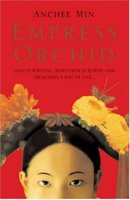 Author: Anchee Min
Author: Anchee Min
ISBN # 0747568332
Publisher: Bloomsbury
First Published: 2004
336 pages
To rescue her family from poverty and avoid marrying her slope-shouldered cousin, seventeen-year-old Orchid competes to be one of the Emperor's wives. When she is chosen as a lower-ranking concubine she enters the erotically charged and ritualised Forbidden City. But beneath its immaculate facade lie whispers of murders and ghosts, and the thousands of concubines will stoop to any lengths to bear the Emperor's son. Orchid trains herself in the art of pleasuring a man, bribes her way into the royal bed, and seduces the monarch, drawing the attention of dangerous foes. Little does she know that China will collapse around her, and that she will be its last Empress.
I’ve never read anything specifically to do with China or Chinese culture (although I’ve been reading a fair bit about Japanese lately), but I’m fascinated by the Orient and this is already significantly fuelling my interest in all things Eastern.
The story seems to glide along very slowly, almost effortlessly, but although there’s not an awful lot “physically” going on, there’s the impression of a lot of background business happening at all times. The descriptions of the Forbidden City (told to Orchid by Fann) are particularly beautiful. The slow, deliberate style seems evocative of Zen teachings (well, what little I know of them, anyway), and there’s a sense of peace and harmony in everything.
An innocence of style that was very strongly in evidence near the beginning, but it became less pronounced as Orchid’s innocence was slowly stripped away. There were several very delicately handled scenes of very intense eroticism too, which served to break down the perception of innocence in the narrator.
I found the interplay between Orchid and An-tei-hai (her chief Eunuch) very interesting and the relationships in general between the concubines and eunuchs were fascinating – the fact that the word of a eunuch could elevate or destroy a concubine’s position within the Forbidden City made every action fraught with danger – it made for some very tense moments that increase the pace very nicely.
The jealousy involved in court life, as seen in other historical novels I’ve read, seemed to be vastly increased under these circumstances as Orchid tried to avoid the pitfalls of living in the Forbidden City and being known to be the Emperor's favourite.
The part that superstition played in all their lives was very interesting to me. It seemed that Orchid wasn’t all that superstitious, despite being considered to be not-so-well-educated as Nuharu (the Emperor’s first wife and Empress above all the concubines), who seemed to be incredibly superstitious and religious by contrast.
This is a fascinating story, with characters based loosely on actual historical figures, firmly entrenched in events that are historically true; a beautifully written tale that draws the reader into a world of political espionage, where the wrong word to the wrong person can mean execution.
Highly recommended.
Rating: 8
 Author: Sandi Toksvig
Author: Sandi Toksvig







